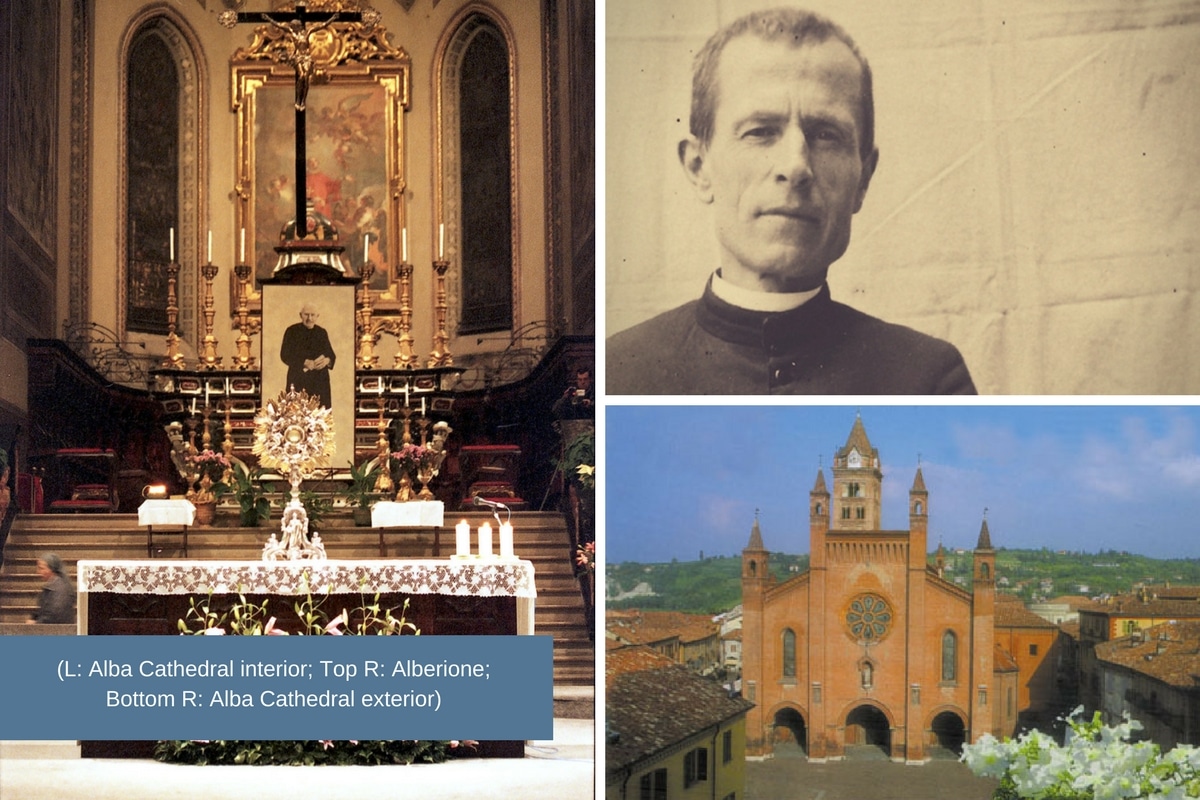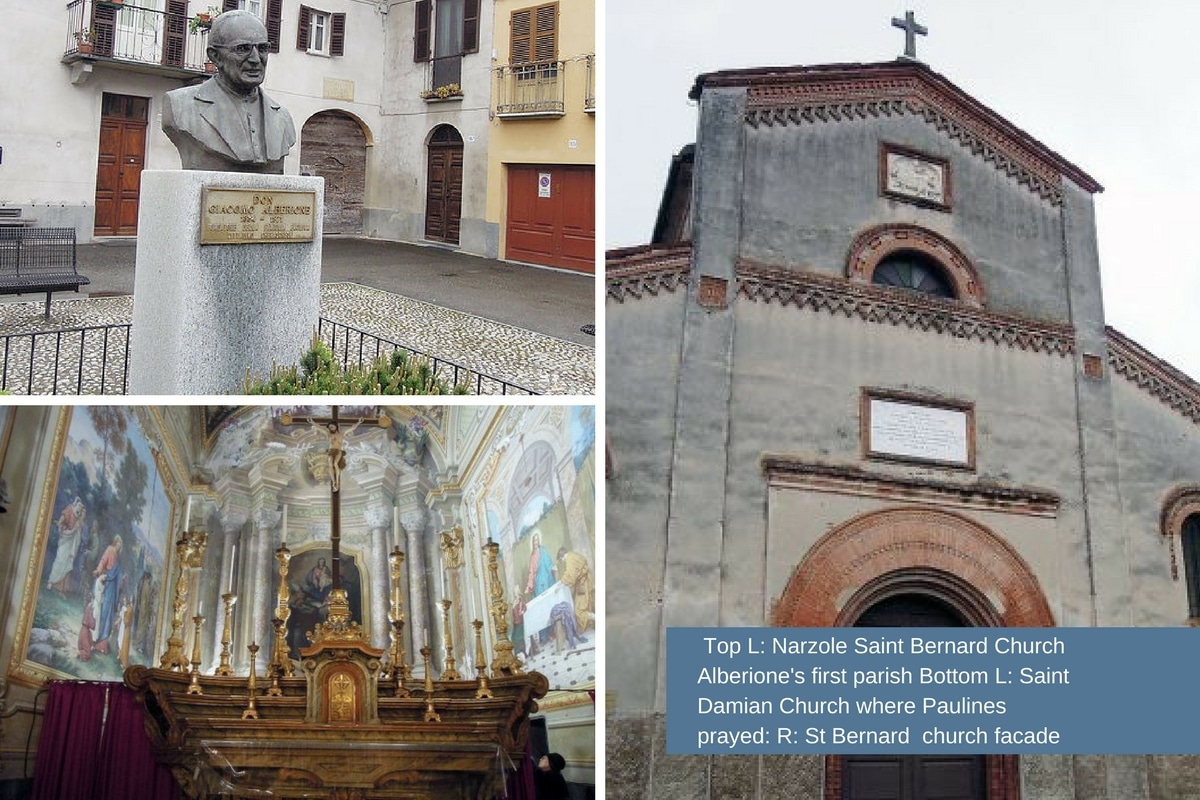At the end of the Holy Year of 1900, James, who had read and reflected deeply on Pope Leo XIII’s encyclical, Tametsi Futura, underwent an experience that would give direction to the rest of his life. On the night of 31 December 1900, the night that divided the 19th and 20th centuries, he prayed for four hours before the Blessed Sacrament and contemplated the future in the light of God. A “particular light” seemed to come from the Host and awakened in him a sense of obligation “to do something for the Lord and for the people of the new century: he felt “obliged to serve the Church” with the new instruments provided by human ingenuity.”
These recollections were given to us by Father Alberione in his later years regarding the light of that midnight adoration, the night between the two centuries December 31, 1900-1901
“The night which divided the last century from the present one was decisive for the specific mission and particular spirit in which the Pauline Family was to come into being and live.

“After the solemn midnight Mass in the cathedral of Alba, the Blessed Sacrament was exposed for solemn, continual adoration. The seminarians in philosophy and theology were free to remain in church as long as they wished. Shortly before that, there had been a convention (the first I had attended), and I had understood well the calm, but profound and convincing talk given by Toniolo (a noted Catholic sociologist and thinker). I had also read Pope Leo XIII’s invitation to pray for the century that was about to begin.
“Both had stressed the needs of the Church, the new means of evil, the duty to oppose the press with the press and the organization with organization, the need to make the Gospel imbue the masses, also the social questions… A special light came from the Blessed Sacrament, a greater understanding of the invitation extended by Jesus: “ Come to me all of you…’ I seemed to understand the heart of the great Pope (Leo XIII), the call sent out by the Church, the true mission of the priest. It appeared clear to me what Toniolo had said regarding the duty of being apostles of the times, using the means exploited by adversaries. I felt deeply obliged to prepare myself to do something for God and the men of the new century in which I would live. I had a sufficiently clear awareness of my nothingness and at the same time I heard: ‘I will be with you until the consummation of the world,’ in the Eucharist; I felt that in Jesus Host I could find light, nourishment, comfort and victory over evil.
“As I thought about the future, it seemed to me that in the century generous souls would feel what I had felt; and that when organized, they would achieve what Toniolo strongly urged: ‘Unite! If the enemy finds us alone, he will overcome us one by one! “Some of my fellow seminarians had—already shared their thinking with me, and I with them all drawing from the tabernacle. “My prayer lasted four hours after the solemn High Mass. I prayed that the new century might be born in the Eucharistic Christ; that new apostles would regenerate laws, schools, literature, the press, customs; that in the Church there would be a new missionary thrust; that the new means of apostolate would be used well; that society would accept the great teachings of Pope Leo XIII”s encyclicals. The latter had been explained to the seminarians by Canon Chiesa (instructor and spiritual director), especially with regard to the social questions and the liberty of the Church.
“The Eucharist, the Gospel, the Pope, the new century… the need for a new army of apostles—these things were so deeply impressed on my mind and heart that later they would always dominate my thoughts, prayers, interior work and inspirations. I felt obliged to serve the Church and the men of the new century and to work with others…. This idea, at first very confused, clarified itself. With the passing of the years, it became concrete.”

James Alberione was twenty two when he was ordained sub-deacon on June 30, 1906, the feast of St. Paul. On that day an interior light revealed to him that few people read the Gospel and the Bible. This light remained like a nail fixed in the spirit of the future Founder of the Pious Society of St. Paul and the Daughters of St. Paul. “The book of God, the book of humanity,” was unknown to many Christians, not to say unknown even to many religious and priests.
This light became the basis of his spirituality and of all his work: to live Christ, who defined himself as “Way, Truth and Life,” and whom St. Paul lived in a total manner.
Alberione was ordained on 29 June 1907 (Feast of Sts. Peter and Paul), and became a parish priest in Narzole. While studying for his doctorate in theology and because of which he was commonly called “The Theologian,” he also dedicated himself to intensive preaching. He was the Spiritual Director and a professor of the Seminary in Alba. Moreover, he was the Bishop’s Master of Ceremonies, a professor of Church and civil history and a catechist. As of September 8, 1913 by appointment of Bishop Re, he was made director of the weekly diocesan paper, the Gazette of Alba. “In this work, he directed and assisted me, with wisdom and firmness, for about twenty years. Everything else developed from this.” “Behold the main way: in Christ and in the Church.”
If the life of the servant of God was committed and industrious from its earliest years, after his priestly ordination it became increasingly more so to an astounding degree.
